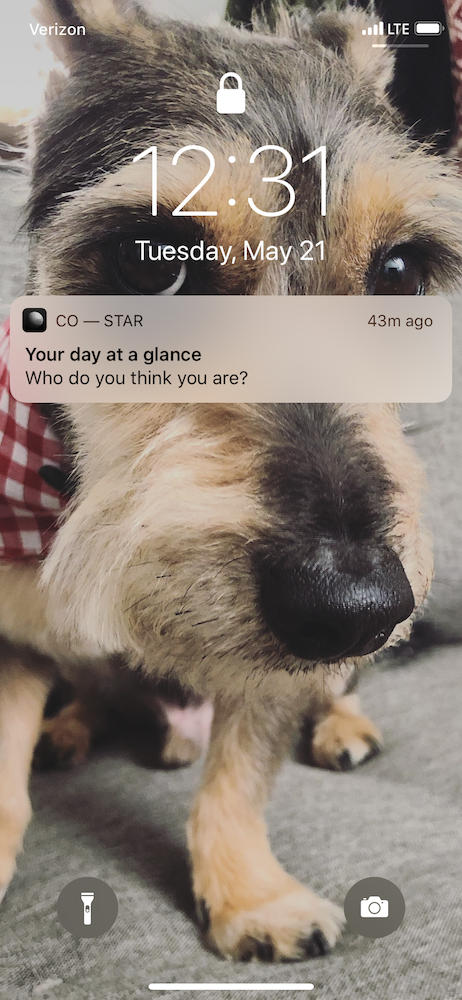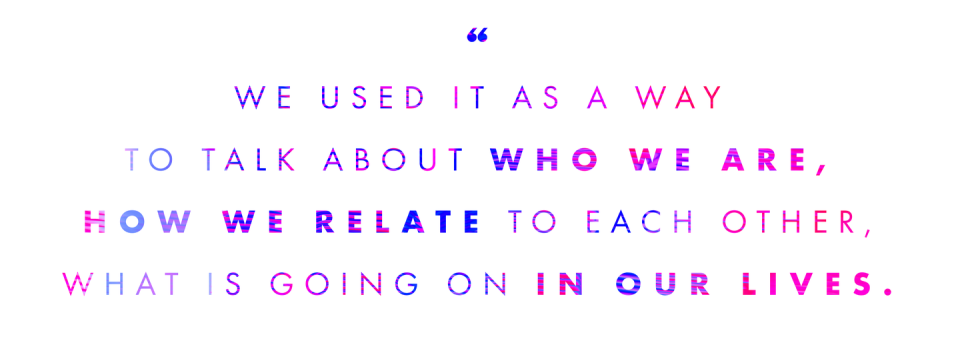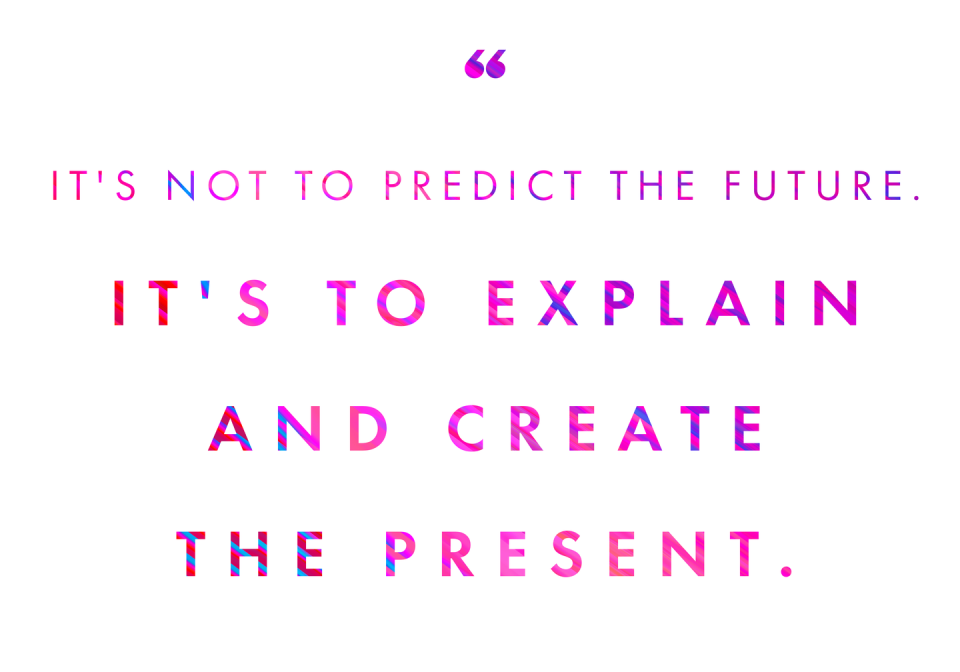Meet Banu Guler, the CEO of Co–Star (You Know, That Astro App That Drags You on the Daily)


Banu Guler looks like a total Scorpio. On an uncomfortably balmy morning in late May, she’s dressed in all-black everything-high-waisted jeans, a thin turtleneck layered under a button-down shirt-with eyeliner and a pixie haircut to match. A simple gold septum ring hovers above her lips. Imagine a 2019 hipster update to The Craft. That’s her.
We were supposed to meet at her office, but she’s mid-move and boxes are everywhere. Instead, we’re sitting at a sidewalk table at Gotan, a minimalist-looking café in Tribeca, New York City’s severest neighborhood. A cool-kid starter pack sits atop the table in front her: a set of AirPods, a Juul, big black sunglasses, and a bowl of chia pudding covered in raspberries and almonds. She’s not drinking coffee-her friend convinced her to do a caffeine fast for a month. It’s really painful.
Yes, Banu actually is a Scorpio, but that’s missing the point. Scorpios have a bad rep. They’re wildly passionate, enticingly mysterious, great leaders. Also: jealous, distrusting grudge holders. In a word: intense. But, again, that’s not the point. “What’s saying ‘Fuck Scorpios!’ going to get you?” Banu asks. “It’s so dependent on the rest of their chart. And also, that’s not what astrology is for.”

Astrology isn’t what it used to be. For one, it’s everywhere. It’s no longer just a pick-up line or something your funky, new age–y aunt talks about or even something you only stumble on in the back of a women’s mag. It’s on your Insta feed, it’s in your beauty bag, and it’s being written about in highbrow media like The Atlantic as some sort of millennial answer to religion.
Oh, and yeah, astrology is now a $2.1 billion market attracting serious venture capital-in spite of the fact that some of those same venture capitalists are skeptics.
But if you’re here, you don’t need me to tell you that astrology is a vital part of your life. Chances are, Co–Star, the crazy-popular AI-powered app that Banu founded (along with two friends), is already chilling on your home screen.

For those who don’t know, Co–Star generates your birth chart based on your time, day, and location of birth. The placement of everything in the solar system from that vantage point at the time of your earthly debut, according to astrology, can explain everything from why you fight with your mom to what career you should consider to what makes you happiest, saddest, and most afraid. Co–Star also provides a daily horoscope and a compatibility feature that lets you compare birth charts with friends. (For $3, you can compare your chart to anyone who isn’t a registered user.) Oh, and push notifications, but more on those later.
The sleekly designed, five-star-rated app is less than 2 years old and already has more than 3 million registered accounts with zero marketing (word of mouth is cooler and cheaper). The app is still growing too. It’ll be available on Android by the end of the year, and more social and educational features are on the way. In April, the company announced $5 million in fundraising from investors. Also important: “Holy fucking god, we are hiring engineers,” Banu tells me. “Please print that.”
Banu has been into astrology for forever. When the 31-year-old native Texan turned Brooklynite was younger, magazine horoscopes were her “gateway drug.” Even before Banu founded Co–Star, astro was how she and her friends communicated. “We used it as a way to talk about who we are, how we relate to each other, what is going on in our lives,” she says. But she thought her crew was different-just a bunch of weirdos (her word) who happened to be into it. Then she went to a baby shower.
She gifted her friend, a new mom, a “book-length interpretation of the baby’s natal chart, kind of meant to be a little bit alienating and hyperaggressive,” she recalls. “I designed it to be really dark and goth.” Everyone, to Banu’s surprise, loved it. Turns out, she was on to something.

And so in late 2016, Banu, then at VFILES, went to lunch with two of her coworkers at the time-Co–Star cofounders Ben Weitzman and Anna Kopp-and approached them about an idea she had for an astrology app. “And it all went downhill from there,” she says in a way that’s both sincere and sarcastic.
The app launched in October 2017. While in development, the already zodiac-fluent trio consulted with several astrologers and studied a shelf’s worth of books, including some spooky-looking old ones ordered off eBay. Today, the Co–Star team has grown to eight full-time staffers. It’s a pretty chill office, Banu says. It’s quiet. They’re mostly vegan. “A lot of water signs.” She has a rule in her office: You can only make fun of your own sign.

Banu can’t tell me too much about how Co–Star actually works. It’s proprietary tech, which is a fancy way of saying they own it and they’re not sharing. But here’s what she can share: The app uses publicly accessible data collected by NASA that “basically maps on a 3-D coordinate system where all of the planets are at any given time.” That data is then transformed into “terracentric data,” which assumes that the universe rotates around us. “In astrology, everything is from Earth’s point of view,” Banu explains. The AI then dynamically stitches together your horoscope.
Now imagine explaining all that to a bunch of Silicon Valley investors. Banu did as much homework as possible. Everything is a question in those meetings. They wanted to know how well she knew her audience-what are your types of users? What are they doing on the app? What is your retention at month 12? “I wore the same clothes for a month straight,” she says, “just to reduce the number of things I had to think about.”

But the most convincing pitch for Co–Star is most likely in your hand right this second. “Anxiety, loneliness, despair...all of those things are on the up-and-up,” Banu says. “And social media is accelerating all of that.” Couple that with a decline in traditional community structures, whether it’s religion or the nuclear family millennials are less likely to have at the age their parents had it. That’s where astrology comes in. “It’s not to predict the future,” Banu says. “It’s to explain and create the present.” And unlike, say, dating apps, the space is far less crowded. (For comparison’s sake, The Pattern and Sanctuary, also popular astrology apps, have a little fewer than 5,000 ratings combined in the Apple App Store. Co–Star has more than 50,000.)
Which is why, as the New York Times reports, venture capital firms like Maveron, Aspect Ventures, and 14W-backers of successful start-ups like Allbirds, Trulia, and Reformation, respectively-have bought into Co–Star.

If you ask the bajillion trend pieces orbiting the internet, we’re in an astrology boom. But the thing about this “trend” is...it doesn’t actually exist. “The National Science Foundation has been polling people since the ’70s about their relationships to astrology from a skeptic point of view: ‘Do you believe in astrology?’ ‘Do you believe astrology is scientific?’” Banu says. “There has been a minor uptick in recent years, but it’s maybe 10 percent. It’s not huge.” According to a 2018 report, about 60 percent of Americans described astrology as “not at all scientific” in 2016, down from 65 percent two years earlier.
That said, visibility is up, thanks to technology. “Meme culture and the idea of creating your own knowledge base and democratizing astrology is something that the internet created in a lot of ways,” she explains. “Until 10, 15 years ago, if you wanted to get into astrology, you had to find a new-age bookstore and buy the books and sit and study.”
Now there are apps-and push notifications. Even if you don’t use Co–Star, you’ve definitely seen its push notifications (part self-help advice, part real-talk sound bite) in your feed. They’re brutal.
Anyone else feel like Co-Star is just goin' OFF on you every morning with that push notification? pic.twitter.com/qZ3nlhpMJS
- Alyssa DeHayes (@alyssadehayes) April 18, 2019
Of course, they were designed that way. Banu explains they’re meant to sound like your group texts: conversational, zero bullshit, lovingly savage. Maybe the most gut-punching of all is how on-point they always seem to be-even if, yes, that’s usually the case with any horoscope, psychic reading, aura reading, etc., etc.
“They kind of drag you, and sometimes you just need that in your life,” says Rachel Sonis, a 25-year-old editorial assistant at a book publishing house in New York City. Even the not-so-savage notifications can be transformational. Just the other day, Rachel, who’s been using the app for about a year and a half, got one that read, “Aim for neat, frank, and uncomplicated.” “And I was like, You know what? I’m not going to be messy today,” she says with a laugh.
Allison Nolden, 24, had to turn them off entirely. The Minneapolis-based graphic designer just found them to be too damn intense. “I’ll get really reflective about what it says, like, ‘You are becoming who you are,’” she tells me over the phone. “I’m like, What does that mean?!” Allison, a triple Sagittarius-“which basically means I’m super emotional”-uses astrology to understand how she gets along with people. But still, she’ll occasionally give in and peek at “those creepy-accurate notifications” when she needs to better grasp what’s going on in her life.

For the record, Banu says the app isn’t listening to you. (Her own interruptive alert today, by the way, reads, “It may help you to remember that every pleasure, every pain, and everybody is impermanent.”) The push notifications are crafted using all that NASA data. “Human writers create snippets for the AI to remember,” Banu says. “And then the AI assembles them in real time, according to what may or may not be relevant to you.”
Banu checks the app around three times a day, both for her own daily horoscope, especially when she’s feeling stressed, and to check on the state of compatibility with her crew. Just a few days before we meet, she’d canceled plans with a friend because of it. “I sent our social ’scope and circled everything that was bad between us that day and was just like, ‘I don’t think we can hang out today,’” she says with a slight self-aware laugh.
Luckily, she doesn’t cancel the next evening when we meet at Mood Ring, an astrology-themed bar in Bushwick. (If the word “Bushwick” means anything to you, this makes total sense.) The vibe inside Mood Ring is similar to the one inside the app: cheeky yet chill, cool in a hipster-y sort of way. Everyone here probably has Co–Star downloaded on their iPhones.
Jake Register, one of Cosmo’s very own astrologers, is a fan. “I like Co–Star so much because the information it gives you-what’s happening in your life, what to expect coming up, why you are the way you are-is accurate,” he writes in an email. “And it tells you why things are happening the way they are.” Admittedly, he’s heard complaints within the astrology community about the app’s exact accuracy and the clunkiness of the compatibility feature, but he blames the AI for that.
While compatibility content is often what consumers are hungriest for, it’s not the best use of astrology, says Jessica Lanyadoo, an astrologer and the host of Ghost of a Podcast. (Jessica doesn’t use Co–Star but hears about it from her clients.) “It’s really hard to give accurate, high-quality compatibility content in a generalized form,” she explains over the phone. “Which is what I think Co–Star probably aims to do.” That said, she’s appreciative that apps like Co–Star make astrology more accessible.
Maybe one day, birth charts will be something Fortune 500 companies pay for instead of, say, the Myers–Briggs Type Indicator. The self-reported questionnaire that determines “personality type” is what Banu points to when confronted with skepticism about astrology. “Myers–Briggs is also generally seen as not scientific by the scientific community,” she says. “But 90 percent of Fortune 500 companies still pay for it because it works. It actually gives people a really material language to talk about who they are, what they’re experiencing, how they relate to each other.”
And that’s exactly what astrology is-a shared language (albeit a more emotionally intelligent one) to help us better understand ourselves and each other.
The Co–Star team often hears from its users via what Banu describes as “love letters.” One of Banu’s all-time favorites was pages long. The user had just broken up with her emotionally abusive boyfriend and decided go back to school despite the sacrifices it’d require (like moving in with her parents) and feeling “really fucking scared.” “She felt like this was the beginning of the next chapter in her life,” Banu recalls, “and she was like, ‘I wouldn’t have made any of these decisions without Co–Star.’”
The Co–Star team looked up the user’s horoscope to see what had inspired her: “You’re good, trust yourself. What you want is real.”

('You Might Also Like',)

